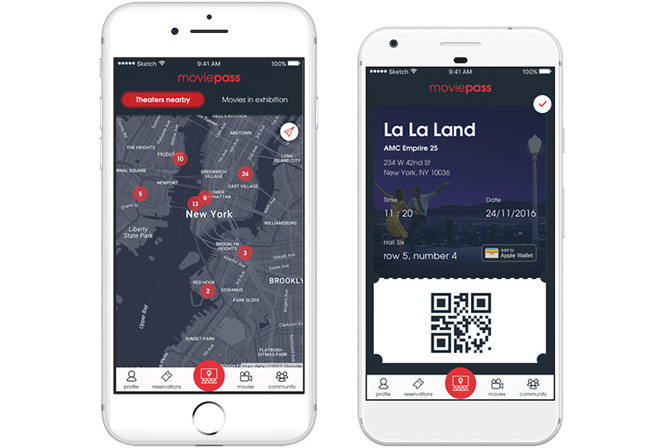The CEO of MoviePass, a popular iOS app and subscription service that lets customers watch a movie a day, caused a bit of a stir in announcing the software tracks user locations via GPS after trips to the theater.

In a recent talk at the Entertainment Finance Forum, first reported by Media Play News last week and subsequently highlighted by TechCrunch on Monday, MoviePass CEO Mitch Lowe offered insight into the company's financial structure, specifically how the firm is able to offer its users a movie a day with a $9.95 per month subscription.
Currently, MoviePass pays theaters the going rate for each ticket, but is looking to garner discounts and revenue sharing deals in exchange for driving traffic, the report said. Prior to Lowe's talk, MoviePass has been for the most part vague on the inner workings of its financial model.
Perhaps more interesting, or for some concerning, is that the app gleans location information from its users.
"We get an enormous amount of information," Lowe said. "We watch how you drive from home to the movies. We watch where you go afterwards."
Beyond GPS-based user tracking, the firm also knows user addresses, which is helpful in determining demographic segment information.
Lowe hinted at potential user data collection and monetization practices during an interview with Recode last month.
"Netflix buys $8 billion of content a year, and believe me, they have to borrow the money to do it. Or companies like Facebook -- it's free, but they're monetizing all the advertising and all the data about you. That's exactly what we are [doing]."
For its part, Lowe said the location tracking feature will one day allow MoviePass to build out user-facing services that span far beyond the theater. For example, the information might be leveraged to suggest nearby restaurants to users looking for a bite before or after a show. These vendors would presumably pay MoviePass a small portion of proceeds for the recommendation.
"Our bigger vision is to build a night at the movies," Lowe said.
Location tracking is alluded to in MoviePass' privacy policy, which notes the app requires access to a user's location when selecting a theater. The information collected in a "single request" to iPhone hardware will also be used to "develop, improve and personalize the service," the firm says.
User tracking is a hot button topic in the smartphone world. For Apple, the issue dates back to at least 2011, when it was discovered that iOS 4 regularly logged location data from iPhones and iPads. Subsequent scrutiny from the media and the U.S. government prompted quick action from Apple, which with iOS 5 began to limit access to unique device identifiers (UDIDs) previously used by apps to track users.
Reports on Lowe's talk were published just days after Apple threw a spotlight on MoviePass in the iOS App Store. In a "Meet the Developer" segment posted late last month, founders Stacy Spikes and Hamett Watt touted iPhone as key to the development and success of MoviePass.
"The idea was almost too early," Spikes said, referencing an earlier attempt at an all-you-can-eat business model he kickstarted in the late 1990s. "We didn't have iPhones and apps to figure out payment and interfacing. If it weren't for that development, MoviePass would never have happened."
Update: In a response to The Verge, MediaPass said it is only exploring the use of location-based marketing to enhance user experiences, promising that any collected data would not be sold to third-parties. As Lowe said, any data harvested from its app would be put toward the creation of a more complete and entertaining movie night experience.
At MoviePass our vision is to build a complete night out at the movies. We are exploring utilizing location-based marketing as a way to help enhance the overall experience by creating more opportunities for our subscribers to enjoy all the various elements of a good movie night. We will not be selling the data that we gather. Rather, we will use it to better inform how to market potential customer benefits including discounts on transportation, coupons for nearby restaurants, and other similar opportunities. Our larger goal is to deliver a complete moviegoing experience at a price anyone can afford and everyone can enjoy.

